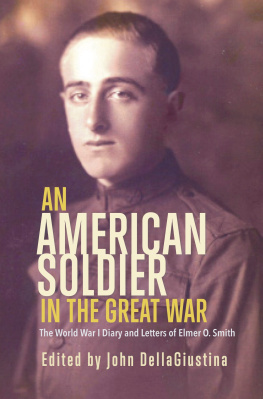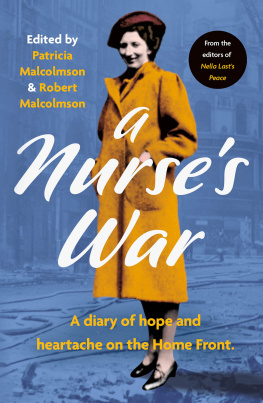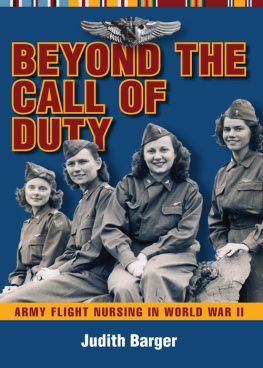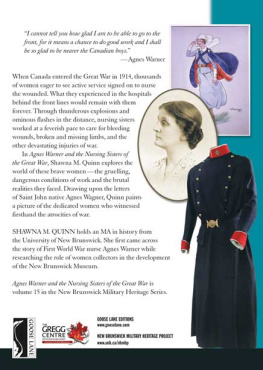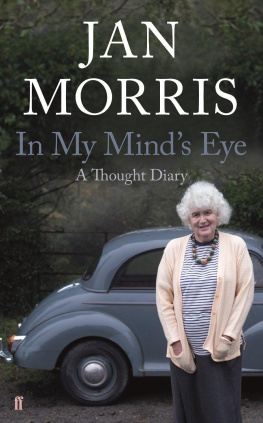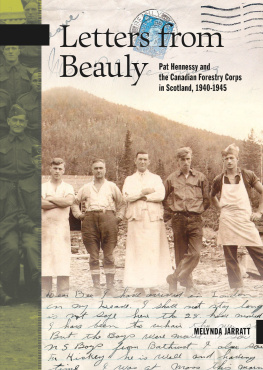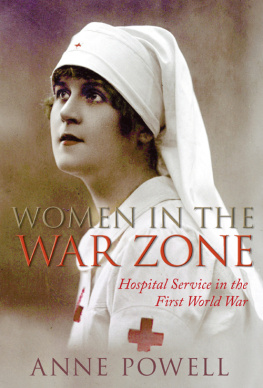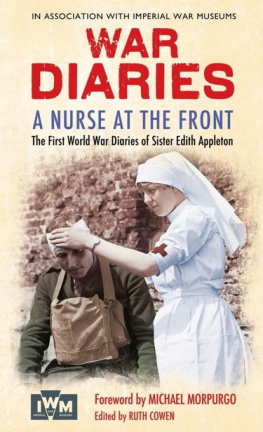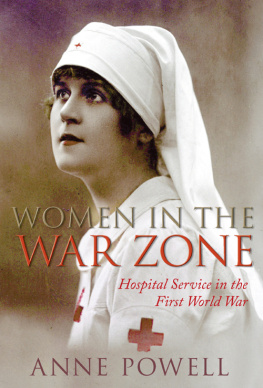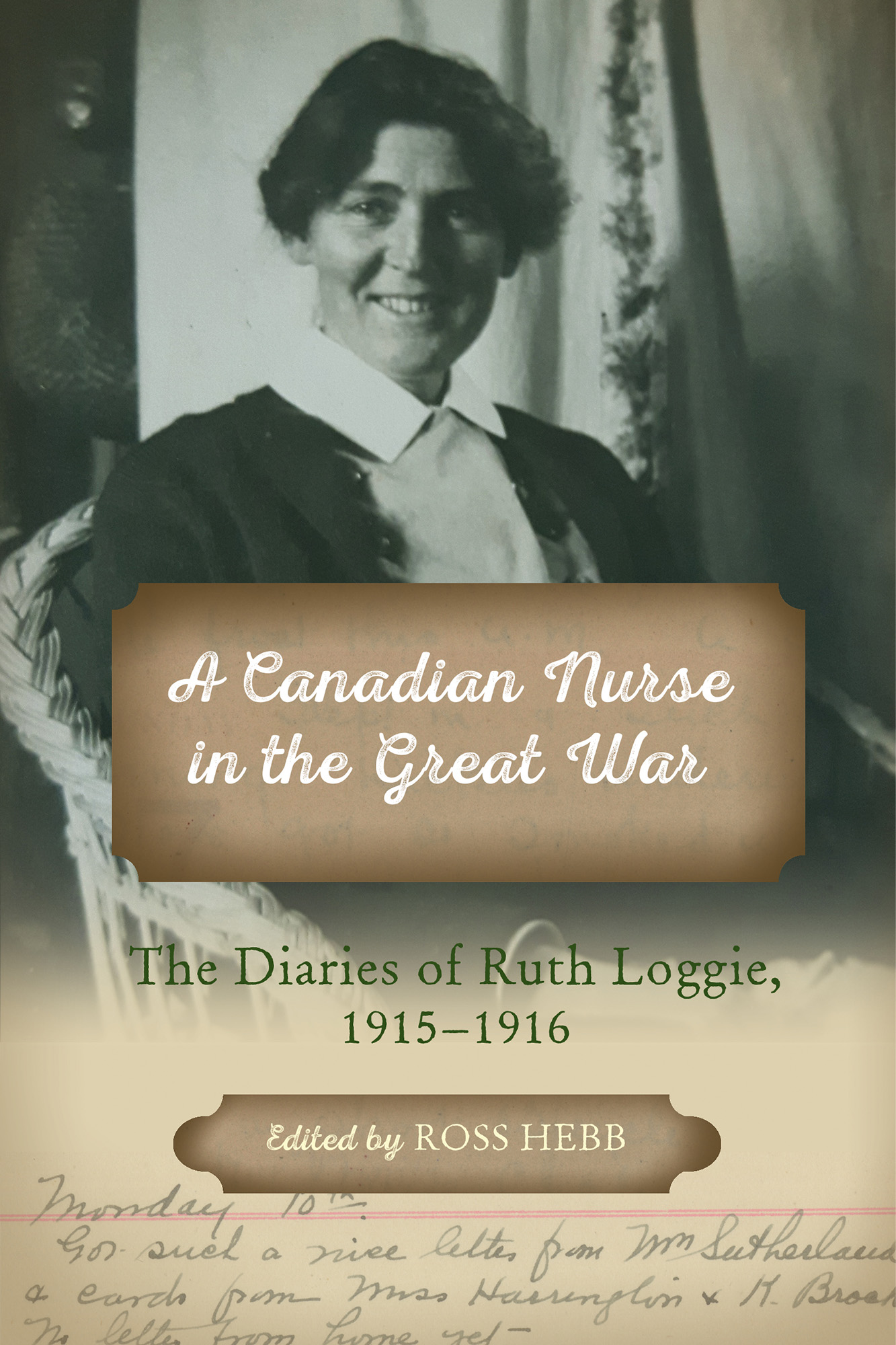
Copyright
Copyright 2021, Ross Hebb
All rights reserved. No part of this book may be reproduced, stored in a retrieval system or transmitted in any form or by any means without the prior written permission from the publisher, or, in the case of photocopying or other reprographic copying, permission from Access Copyright, 1 Yonge Street, Suite 1900, Toronto, Ontario M5E 1E5.
Nimbus Publishing Limited
3660 Strawberry Hill Street, Halifax, NS, B3K 5A9
(902) 455-4286 nimbus.ca
Printed and bound in Canada
NB1539
Editor: Marianne Ward
Cover design: Heather Bryan
Interior Design: Jenn Embree
All images generously provided by John Gass (nephew of Clare Gass)
Library and Archives Canada Cataloguing in Publication
Title: A Canadian nurse in the Great War : the diaries of Ruth Loggie, 1915-1916 / edited by Ross Hebb.
Other titles: Diaries of Ruth Loggie, 1915-1916
Names: Loggie, Ruth, author. | Hebb, Ross N., 1960- editor.
Identifiers: Canadiana 20210215410 | ISBN 9781774710128 (softcover)
Subjects: LCSH: Loggie, RuthDiaries. | LCSH: NursesCanadaDiaries. | LCSH: World War, 1914-1918Personal narratives, Canadian. | LCSH: World War, 1914-1918Medical careCanada. | LCSH: World War, 1914-1918WomenCanada. | LCGFT: Diaries.
Classification: LCC D630.L64 A3 2021 | DDC 940.4/7571dc23

Nimbus Publishing acknowledges the financial support for its publishing activities from the Government of Canada, the Canada Council for the Arts, and from the Province of Nova Scotia. We are pleased to work in partnership with the Province of Nova Scotia to develop and promote our creative industries for the benefit of all Nova Scotians.
Dedication
Dedicated to the memory of the Great War nurses of
the Canadian Army Medical Corps and to the McGill
graduate I love and admire, my wife, Linda M. Hebb,
MD, CM; CCFP (EM); FCFP.
Acknowledgements
A work such as this is a collaborative effort spanning several years. First, I would like to thank Ron Stevenson for initially bringing to my attention the existence of Ruths wartime diaries. Next, Barbara Wilsons enthusiasm and willingness to share the manuscript text as well as her knowledge of Ruth provided watershed moments in the journey. I also wish to thank the Historical Committee of the Burnt Church and New Jersey Senior Citizens Group for the opportunity to examine Ruths 1916 diary. On two separate occasions Margaret McLeod welcomed me to their facility. Dedicated volunteer local groups such as theirs are a key factor in finding, preserving, and perpetuating our history. As always, the staff at the Provincial Archives of New Brunswick extended to me every courtesy and professional assistance in examining the 1915 diary. John Gass, Clare Gasss nephew and the keeper of her valuable wartime photo album, was both generous and most patient in providing scans of precious photographs even under COVID-19 pandemic restrictions. I would be remiss not to note the assistance of my initial proofreader, Wilfred Alliston. For the past twenty-five years he has not only helped improve my writing, but has also come to intuit what I am attempting to communicate. Nimbus editor Marianne Ward also has a keen eye for detail and required me to explain myself, which doubtless has served to improve the final copy.
Introduction
The Great War diaries of Ruth Loggie are a rare find. but they are special in other ways as well. They provide a glimpse into a part of our history that up to that point had been forbidden territorywomen at war.
Canadian nurses were part of the Canadian Expeditionary Force (CEF) and actively involved in our countrys war effort. They were part of the Canadian Army Medical Corps (CAMC), whose task it was to care for wounded soldiers. What that meant was, if at all possible, to heal the soldier, not so that he could come home, but so that he could rejoin the fight. Although shielded from actual combat, Canadian nurses did serve in France and Belgium. While initially kept back from the front, nurses did eventually function in forward areas known as Casualty Clearing Stations (CCS) well within the range of enemy artillery fire. In addition, by 1918, the extensive system of tent hospitals at the French coast where most of the nurses were stationed became subject to almost nightly attack by enemy bombers. In sum, by wars end, being a nurse on the continent was not only dangerous but deadly. As a result, Canadian nurses, like the men they cared for, lie buried in French soil.
Not only are the stories of Great War nurses little known, but there is also a distinct paucity of their experiences in the historical record. The official history of Canadas medical services in the Great War only contains six pages, written by Matron MacDonald, on the contribution of nurses during the war.
Why Canadian nurses almost universally neglected to respond to the request from their own leader for source material has, in recent decades, baffled historians and womens studies professors. A plausible answer seems to lie in the combined effect of three interconnected considerations. First, in the immediate postwar period, when the first request for information was made, the majority of nurses had other more pressing matters to attend to: reintegration into civilian society and employment. With as much as four years of military nursing overseas and a depressed postwar job market, Canadas returned military nurses had little time to pause and reflect. They had to settle down, find employment, and get on with their lives. Second, each nurse was hard-pressed to see her particular experience as worthy of note. All the other nurses she encountered had had similar experiences, and she considered that she had just done her bit. Furthermore, compared to those of the boys these women nursed, their experiences seemed, to the nurses themselves, light and of little interest. Reinforcing this reality, the Canadian public and the press on the home front had for years been obsessed with battles and bravery, not nurses and wounds. Third, and perhaps most telling, the very nature of the nursing profession, which they epitomized, taught them to be self-effacing, humble, and to keep confidences. Chattering about the men they nursed and the experiences they had had was exactly what they were taught not to do. The nurses had internalized this message, and they clearly endorsed its emphasis on discretion and quiet. A further proof of this collective reticence is the fact that only four of the Canadian nurses individually and independently published any account of their personal experiences during the remainder of their lives (see note 3).
Notwithstanding these sentiments, there is another component to Great War nurses service that is seldom given sufficient weight in the historical narrative: what these nurses actually saw and worked with on a regular basis, the reality of modern, industrialized warfare. In short, they witnessed first-hand the application of recent advances in modern science to the business of killing other humans. Just like the soldiers in the trenches, the nurses saw the gaping shrapnel wounds, the gas victims gasping for oxygen, and the steady stream of pitiful, mangled men. As Ruth commented early in her experience, All our men are splendid [patients] and some so badly cut up. Along with the doctors and orderlies, this was the nurses wartime environment. It was what they lived in and worked within many cases, including Ruth Loggiesfor four years. How did they cope? What were their thoughts as they lived through what they knew were world-altering events?
Next page

